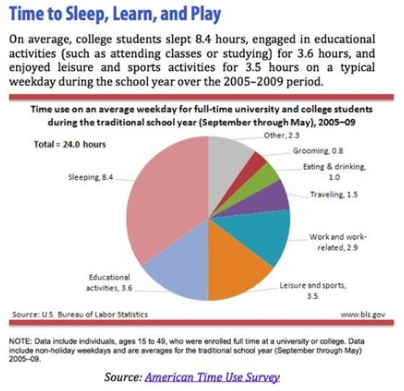How To: Stay Healthy in College

By: Carley Borrelli
Living on your own and having access to the unlimited meal plan, downtown nightlife, and weed-out classes can cause high levels of stress for new, wide-eyed freshman. It is important to figure out early on how to balance all aspects of your life in college so you’re not regretting your choices as finals roll around. Below, there are several easy tips to help manage stress, eat well, and leave you time to enjoy the college experience.
- According to the Bureau for Labor Statistics, college students are getting an average of 8.5 hours of sleep per night. While this might be true for some of us, there are many students that survive on five or less hours of sleep a night. It is important to aim for seven to eight hours of sleep every night to try and balance out the occasional all-nighter you might pull before a test.
- Creating a routine for yourself will help you balance and divide your time well. By setting aside time to study for your classes, hang out with friends, and hit the gym, you will decrease your stress and feel much more relaxed.
- When heading to the dining hall, try and make healthier choices. It can be tempting to always order a coffee from OHouse or grab a cookie or two on your way out, but these sugary choices can add up. Try and replace the cookie with an apple or banana and have milk or water with your meal instead.
- While it can be tempting, it’s never a good idea to skip class. Especially if the class size is small, it can be extremely disrespectful to professors if students are not coming to class. Research has shown that attendance is statistically significant in explaining class grade, and students who miss class frequently significantly increase their odds of earning a poor grade. If this hasn’t convinced you, some teachers require an attendance policy, so make sure you review the syllabus before you decide to play hooky.
- Take advantage of the variety of exercise activities at Ramsey. They hold workout classes every day, have a track above the basketball courts, and there are separate workout rooms for girls and guys. It is important to get at least 30 minutes of physical activity a day. If you’re having trouble sticking to it, invite a friend along so you can have someone there to exercise with and motivate you.
- There are hundreds of organizations on campus for literally anything you can think of. It’s a good idea to try out a couple of organization you’re interested in your first year. They’re a great way to meet new people that share a similar interest and involve yourself in something you are passionate about.
- Instead of taking the bus between classes, try to walk as much as you can. It may be difficult to do if you have two back-to-back classes on north and south campus, but if you have the time, it’s a great way to increase your exercise and get your blood pumping!
- If you don’t already have one, buy a water bottle and carry it with you on campus. There are plenty of places to fill it up on campus and water is a refreshing and cheaper alternative to sugary drinks.
- For those students that are commuting or living off-campus, the UGA Health Center has a nutrition kitchen where they host cooking classes a few times a semester. The class costs five dollars, and you get to eat what you cook. They also have an easy take-home recipe for you to make it yourself at home. If you’d rather pick your recipe from their extended list, you can reserve a special class for you and five of your friends.
- Most people don’t know that there is a Quiet Reflection Room in Tate that is open to all students. It is suggested that students use this quiet space for brief prayer, meditation or individual reflection for ten minutes. This room is located in the hallway between old and new Tate, and is a great place to recharge.
- If you find yourself struggling or just need someone to talk to, contact UGA CAPS (Counseling and Psychiatric Services). The cost was included in your student fees, so it’s free to set up an appointment, and it’s a great resource for stress and life management. They offer short-term individual, group counseling, psychological assessment, and other services.
I hope these tips offer you some good advice at succeeding in college and you decide to incorporate some of them into your daily life!
References:
http://www.uhs.uga.edu/nutrition/kitchen.html
http://www.mnsu.edu/cetl/teachingresources/articles/classattendance.html

